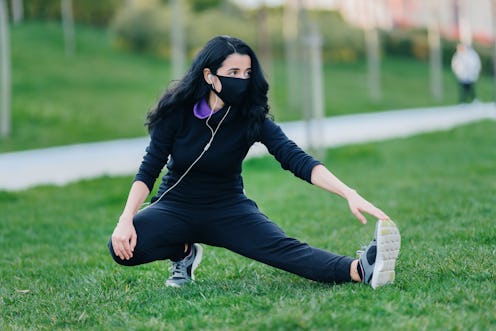
You've been taking yourself out for walks every day, but you can only stroll around the block so many times without coming down with an outdoor version of cabin fever. But just because your local parks might be open again doesn't mean you should go frolicking in the grass without regard for physical distancing measures. If you're heading into the wild for some outdoor fun, first brush up on how to visit parks safely during the pandemic.
"There are many benefits to local parks — getting outdoors in nature and sunlight is great for your physical and mental health," says Dr. Arefa Cassoobhoy, M.D., senior medical director of WebMD. "And it’s a wonderful change of scenery from your home for those of you sheltering in place."
Fortunately, it's not just good for your mental health to stretch your legs and get some sunlight — Dr. Cassoobhoy tells Bustle that it's one of the safer things you can do outside the home right now. "The evidence suggests the virus doesn’t spread easily outdoors, so a spacious, quiet park is a much better option than a public indoor space," she says.
Relatively safer doesn't mean completely safe, though. "You’ll want to practice physical distancing if heading to your local park," Dr. Cassoobhoy tells Bustle. "Just like all public places, there may be people there who are not sick, but they might be infectious."
Even though the local regulations about what you're allowed to do in parks vary, Dr. Cassoobhoy says that caution is still your safest bet. "The best activities are more solitary ones, like walking, running, or biking on a wide path. Some people aren’t wearing face masks during strenuous exercise, so space yourself much farther than six feet from others around you."
The Centers for Disease Control and Prevention (CDC) says to stick to parks closest to home, but only venture in if it's not packed with people. "Consider your physical safety, since you’ll want to choose a park that does not have crowds," Dr. Cassoobhoy says. "Avoid touching anything, so don’t plan on a pickup basketball game, climbing playground equipment, or visiting the park bathrooms." Even if you're refraining from pickup ball, it's a good idea to bring some hand sanitizer anyway. Dr. Cassoobhoy recommends thoroughly washing your hands both before and after your outing.
You'll also need to rock your newest rainbow-patterned face mask or bandana, Dr. Cassoobhoy says. "Wearing a face mask is important, especially if you’re meeting a friend at the park. Along with keeping the six foot distance, a face covering protects others from your respiratory droplets as you speak."
If you, your friends, and all your friends' cousins decide to descend on the same park at the same time, even the best intentions of wearing masks and keeping six feet apart might not help. "Parks are a natural gathering place for the community, so it can be a challenge to limit the crowds," Dr. Cassoobhoy tells Bustle. "If your local park is crowded with others not social distancing, protect yourself and don’t go." Note the time and day that other folks seem to flock to the grass, and check back at a different time or day to find when your park is the least crowded.
"Our understanding of the coronavirus is evolving, so best practices for going to a local, public park (and other places) may change over time," Dr. Cassoobhoy tells Bustle. "Stay informed and use your common sense as you make decisions about how to go out and be safe in public places."
Experts:
Dr. Arefa Cassoobhoy, M.D., senior medical director, WebMD